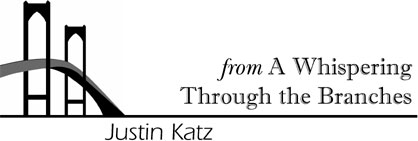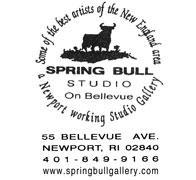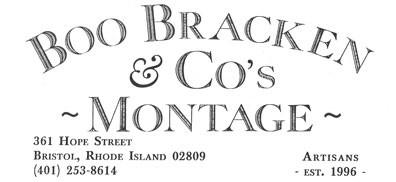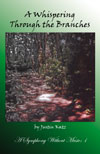



Nathaniel
was always amazed when they found their place in the
city. Providence was a maze because it was a city rebuilding. And
though Nathaniel, as a rule, preferred the image of cities falling into
ruin from disuse, he could not escape the reality that there were
opportunities to indulge in culture that the bucolic areas could only
provide in small, amateur doses to the extent that they did at all. Ideal,
to his way of thinking, would have been the reinstatement of the arts
seeping into the country in search of audiences as it had been when
the only entertainment, other than the Bible, that was offered to
farmers and artisans was the occasional traveling show: minstrels,
acting troops, and the grander but less artistic fairs and circuses

(which, even though he knew
he
romanticized them, seemed to have
been less ostentatious, but perhaps
more authentic for their touch of
darkness).
But Nathaniel realized that,
for this
ideal to become the custom, the
artists of the world would have to
return to the tradition of either
utilizing their particular talents for
their own sakes, in which case


Timshel Literature
merely performing is the object and any available crowd, wherever it might be gathered, is as good as another, or to the idea that they were on a mission of some kind, whether educational or proselytic in nature; so he and his wife-to-be had found for themselves a restaurant, though few really went there to eat, that answered both Nathaniel’s longing to see the reign of cities decaying and his need for culture because the restaurant (more properly called a bar) was host to jazz musicians, folk singers, spoken wordists, and any other performer whom the clientele might fancy on the ground floor of an otherwise unoccupied, crumbling factory building. Nathaniel himself played there on occasion in the Winter months, less now than when he had made his go at stardom through other methods than he had recently stumbled upon.
This being the case, the owner, the waiters, and a good number of the regular patrons knew him at sight, if not by name, and welcomed him with smiles and pleas for him to play. Often he would hop onto the stage and sit at the old and furrowed, and always appealingly out of tune, piano while the hired band of the evening relaxed for a time among the audience and then drifted back to their instruments and joined him.
On this evening on the cusp of Autumn, with Summer still beating through the open windows and the door, Nathaniel and his fiancé walked into the bar while the band was already away from the stage and indistinguishable in the crowd. Hands clapped Nathaniel on the back while their counterparts waved and pointed toward the stage. Nathaniel gave Jen a look of feigned reluctance, and she swished both hands at the piano with a laugh. Smiling demurely, Nathaniel kissed her and plunged into the throng of bodies. People looked at him and made way, some vaguely acknowledging him with nods, others sensing the general recognition. Jen spotted a friend and slipped through a break in the swarm.
Nathaniel stroked the keys of the piano lightly at first, recalling the piano’s feel and personality. His playing was aimless and subtle, barely audible over the collected murmurs around him. Some of the people who had been pressed toward the stage paused in their conversations to ascertain whether the faint music was merely some indistinct reminiscence that only they could hear. As more eyes picked him out and lingered on him, Nathaniel felt the recrudescence of the old habits of euphoria and expanded his melodies, striking them out of the piano more forcefully. Talkers began to refer to him, who is he?, and nod, oh yeah. Heads could be seen floating toward him through the crowd. He settled on an idea and secured it, beating out the rhythm in chords with his left hand. Then he broke it apart in the melody and in the rhythm and brought it back, and unraveled it into simplicity and threw it open toward commotion. And the heads nodded. He skipped the rhythm of the pattern tritely and somebody laughed. He slowed and raced, finally bringing it down even and low with spurts of broken rhythm. He smiled at the drummer, who was taking up his sticks, because he knew him, and they both took it on, hands together then clashing. Nathaniel softened and the drummer picked it up and took it out then back and Nathaniel went up high when the bass bellowed in. And the bass player winked and took off, with Nathaniel chasing after him and the drummer holding them together. Then a saxophone growled on top from out of nowhere, and Nathaniel looked to see the blower but only saw his back. And he was quick and full of life. Then hurled out a line and it came back, and he returned it upside-down and it was changed and kept going when he picked it up again, and the two instruments beat it out against each other and in harmony and the drummer gave it up and smacked wildly at his drums while the bass groaned out long improbable sighs and the horn screeched and the piano crashed out walls of chords and nonsense runs. Then suddenly, everything was silent and the crowd was mute and breathless. A drop of sweat dripped from Nathaniel’s nose, and when it hit the keyboard his original idea burst out of every instrument in unanimity and stopped.
The crowd roared. Nathaniel stood and smiled. He passed a secret signal to Jen, who had joined her friend at a table. He nodded elatedly at the drummer and smacked the bass player on the back and looked toward the flash of the saxophone, which was raised in acknowledgement of the applause. The horn player turned, and Nathaniel saw that it was Sal.
“Mr. Nathaniel Ariss on the keys,” Sal announced, pointing his sax at Nathaniel. “Piano player and author extraordinaire!”
And with that, Sal put his horn to his lips and signaled the band to swing into the next tune. Nathaniel, not sure what should be his response gave a final wave of his arm and hopped off the stage. Jen was sitting with a group of people whom he knew only slightly. They all complimented his performance.
“That was great, honey,” Jen told him, asking, “have you played with all of them before?”
Without thought, Nathaniel responded, “All but the sax player,” not knowing why he lied.
“Oh,” said Jen, looking a little bemused. “How did he know your name?”
“I don’t know.”
Jen gave it some thought. “I guess he’s read your book, and somebody must have pointed you out,” she reasoned.
“Maybe,” Nathaniel told her, relieved to escape the need to lie further but more than a little concerned that it had been his first impulse to deceive. Then the evening out came on suddenly and its opening scene was all but forgotten by everyone but Nathaniel, who kept it circulating in his mind despite the waves of music from the stage and the onslaught of people who wanted to compliment his piano playing or congratulate him on his having published a book; he suspected that none of these latter had actually read it, as evinced by their offering no evidence either way. Even his increasingly boisterous companions at the table were unable to divert his attention from the impassive figure on the stage who, whether burning up or lulling the keys of his saxophone, gave no sign of zeal or strain behind his sunglasses. This is too random to be random, thought Nathaniel.
When the band left the stage for another break, several people pushed through the crowd with a stagger in their step and urged Nathaniel to fill the gap at the piano. The suggestion was taken up by those at his table and nearly took the force of a chant, but Nathaniel blushed and smiled and kindly refused. He was still bothered by the man with whom he had spent more time than any of those around him but his fiancé and who lingered on the edge of his vision until it was time for the final round of music to begin. There had to be something going on, Nathaniel reasoned, or else Sal would have come over to speak with him, even if under the guise of a stranger.
Distracted though he was, through the resumption of the jazz and the pulse of conversation and life and the occasional hush of the audience as the band swept into realms of virtuosity and ingenuity that bordered on brilliancy and the bells for last call and the push of the crowd to the bar and the ripple of inebriated laughter that floated the atmosphere all around him, Nathaniel still turned over and over in his mind his possible actions. Then, suddenly, it was out of his hands because the crowd, without his noticing, dissipated as if it had been half populated by figments of his imagination, and his table was emptied. As the final note was played and the final cue that the show was over was given by the slight reverberation of the instruments as they were laid down, Jen excused herself to the ladies room, and Sal, more ghostlike than even the now evaporated audience, stood before him.
“How’s it goin’, Nathaniel?” the specter asked.
Stammering, Nathaniel responded, “Fine. Just fine. How about with you?”
Sal shrugged and pulled back his lips in an ambiguous line, and Nathaniel saw his eyebrows peak over the edge of the glasses. “Could be worse, could be better.”
Giving an unimportant rejoinder, Nathaniel fell into silence. The drummer came over to tell Sal that it had been a lot of fun playing with him and said goodnight to Nathaniel. Nathaniel turned to Sal when the drummer had gone, “So what brings you to Providence?”
Nonchalantly, Sal told him, “I’ve been looking for you.”
“Oh?”
“Yeah, the bio in your book only said Rhode Island, so I figured I’d catch up with you if I played around Providence for a while.”
“Have you been around long?”
“Not long.”
Seeing that Sal was not going to offer up his intentions without being prompted, Nathaniel asked, “So, why were you looking for me?”
As if this question had been some cue in a script to which Nathaniel had not been privy, Sal flung himself into a chair at the table. “You’ve been havin’ some success with that book of yours, haven’t you?”
Nathaniel spoke cautiously, “I suppose so. Did you read it?”
“Yeah, some of it. Listen, what I’m wonderin’s if you could help me slip into the big time.”
“I don’t know what you mean.”
“Aw, come on, we both know that when yer in, yer in. I just need some help getting a shot. All you’d have to do is introduce me to some people or get me a gig at some party where there are important people. Or maybe you could just bring some of your literary friends to see me. Man, I’m good, I just need some exposure.”
Nathaniel wasn’t sure what he could do. “I know you’re good… really good, but I don’t have many friends period, let alone any with clout in the music business.”
“No, man, you don’t get in the club without someone openin’ the door for ya. You gotta know somebody. All I need’s a break. It’d be no sweat off your back.”
“I’d really love to help you, Sal, but I just stumbled into getting my book published, and it hasn’t made such a big hit that I’m anybody that people would come to for advice on music.”
“So how’d you get published?”
Nathaniel leaned toward Sal like he was going to tell him a secret, “The lady, Sybil, she snuck back to the house and took the manuscript. All I did was sign a form and cash the check.”
Sal leaned back in his chair, giving the impression, though with no particular gesture or facial expression, that he was disappointed and a little bit skeptical. “So you were just lucky is what you’re sayin’.”
“Exactly. I don’t know why she did it, but that was my in.”
Sal seemed to mull this over for a second, then asked, “Where’s she?”
“Your guess is as good as mine. I guess you could find her at the publisher’s office in New York. Other than that, I haven’t a clue.” Then he added, “I haven’t spoken to her since we all left the Pequod.”
Just then, with a woman’s perfect timing, Jen returned to the table. “Is he boring you with his literary talk?” she asked Sal.
Nathaniel stood, Sal following his lead, and motioned toward the horn player. “Jen, this is Sal; Sal, this is my fiancé, Jen.”
“Very nice to meet you,” Jen spoke first. “You were really great up there.”
Sal smiled, if only slightly, and said, “Thanks. It’s too bad more people don’t get to hear me.”
Nathaniel wished that he could see through Sal’s dark glasses. He didn’t like the idea that Sal might think that he was lying about not being able to help him with his career. He considered whether he might not be able to help Sal after all if they went to New York together. But Jen saved him from making a suggestion that he knew he would regret before he had decided to make it by announcing that she was very tired and wanted to go home.
She smiled at Sal, and they all said goodnight. As Nathaniel walked out the door with Jen holding his arm, he was still bothered by the idea that Sal might think that he was lying, and he wished that there were something that he could do.
The house lights come on to drive away the few remaining stragglers, driving away only the darkness and with it the mystical atmosphere. The room is dingy and sticky. On the floor, the dust clings to spilled drinks like so many tiny, fiendish drunks. One of the waiters appears from the back with a mop, followed by another with a rag and a bottle of blue liquid. They hurry through the motions of cleaning so that they can leave, either to go home or to find some other bar that hasn’t dispersed its magic quite so early.
As if the disintegrated dream and the odor of cleanser is enough to accomplish what the light could not, even the most reluctant patrons make their way sullenly through the door into the cool night. Then the staff, some tired, but most impatient to be elsewhere, begins to leave to the sounds of cash drawers slamming shut and chairs being thrown atop tables.
Soon the owner emerges from a door marked “Employees Only” carrying a locked metal box and checks the registers to make sure that they are closed. He gives a quick inspection to the large room that is now as clean as it ever gets. Together with the bouncer, he steps from his place of business into a city that is as quiet as it ever is, not even hearing the rush of cars on adjacent streets or the occasional honking horn or the rumble of a distant train. He locks the door behind them, shakes the knob firmly, and walks, a barely perceptible nervousness in his stride, to his car.
